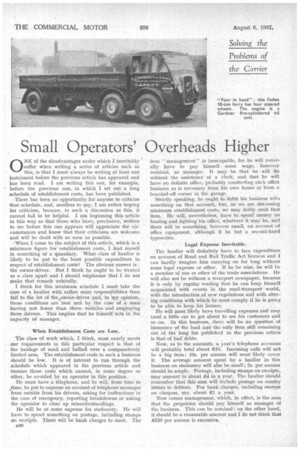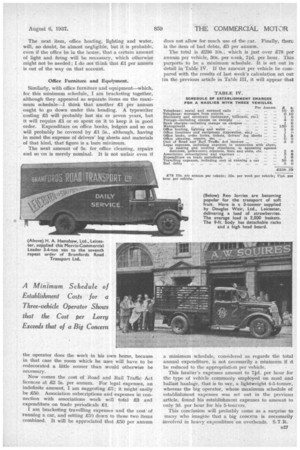Small Operators' Overheads Higher
Page 32

Page 33

If you've noticed an error in this article please click here to report it so we can fix it.
ONE of the disadvantages under which I inevitably ' suffer when writing a series of articles such as this, is that I must always be writing at least one
instalment before the previous article has appeared and has been read. I am writing this one, for example, before the previous one, in which I set out a long schedule of establishment costs, has been published.
.There has been no opportunity for anyone to criticize that schedule, and, needless to say, I am rather hoping
for criticism, because, in such a discussion as this, it cannot fail to be helpful. I am beginning this article in this way so that those who have, perchance, written to me before this one appears will appreciate the circumstances and know that their criticisms are welcome and will be dealt with so soon as possible.
-IWhen I come to the subject of this article, which is a minimum figure for establishment costs, I find myself
in something of a quandary. What class of haulier is likely to be • put to the least possible expenditure in respect of establishment costs? The obvious answer is : the owner-driver. But I think he ought to be treated as a class apart and I should emphasize that I do not make that remark unkindly.
-I think for this minimum schedule I must take the case of a haulier with rather more responsibilities than fall to the lot of the-,owner-driver and, in w opinion, those conditions are best met by the case of a man having not fewer than three vehicles and employing three .drivers. This implies that he himself 'acts in the
capacity Of manager.
When Establishment Costs are Low.
The Class of work which, I. think, most nearly meets our requirements in this particular respect is that of the haulage of sand and ballast over a comparatively limited area. The establishment costs in such a business should be low. It is of interest to run through the schedule which appeared in the previous article and itemize. those costs which cannot, in some degree or other, be avoided by an operator in this position.
He must have a telephone, and he will, from time to time, be put to expense on account of telephone messages from outside from his drivers, asking for instructions in the case of emergency, reporting breakdowns or asking the operator to clear up misunderstandings.
He will be at some expense for stationery. He will have to spend something on postage, including, stamps on receipts. There will be bank charges to meet. The
item " management " is inescapable, for he will naturally have to pay himself, some wage, however nominal, -as manager. It may be that he will do without the assistance of a clerk, and that he will have no definite office,probably conducting such office business as is necessary from his own house or from a
boarded-off corner in the garage. • •
Strictly speaking, .he ought to debit his business with something on that account, but, as we are discussing minimum establishment costs, we may fairly omit that item. He will, nevertheless, .have to spend money on heating and lighting his office, whatever it may be, and there will be something, however small, on account of office equipment, although it be but a second-hand typewriter.
. Legal Expense Inevitable.
The haulier will definitely have to face expenditure on account of Road and Rail Traffic Act licences and can hardly imagine him carrying on for long without some legal expense or other. If he be wise, he will be a member of one or other of the trade associations. He will also not be without a transport newspaper, because it is only by regular reading that he can keep himself acquainted with events in the road-transport world, with the introduction .of new regulations and with altering conditions with which he must comply if he is going to be able to keep his licence.
He will most likely have travelling expenses and may need a little car to get about to see his customers and so on. In this business, there will be no question of insurance' of the load and the only item still remaining out of the long list 'published in the previous article is that of bad debts. • Now, as to the amounts, a year's telephone accounts will probably total about £10. Incoming calls will not be a big item: 10s. per annum will most likely cover it. The average amount spent by a haulier in this business on stationery will also be small ; 5s. per annum should be ample. ' Postage, including stamps on receipts, may amount to about £4 in a year. The haulier should remember that this sum will include postage on sundry letters to debtors. For bank charges, including stamps on cheques, say, about £1 a year.
Now comes management, which, in effect, is the sum that the proprietor should pay himself as manager of the business. This can be nominal: on the other hand, it should be a reasonable ameunt and I do not think that £150 per annum is excessive. The next item, office heating, lighting and water, will, no doubt, be almost negligible, but it is probable, even if the office be in the house, that a certain amount of light and firing will be necessary, which otherwise might not be needed; I do not think that £1 per annum is out of the way on that account.
Office Furniture and Equipment.
Similarly, with office furniture and equipment—which, for this minimum schedule, I am bracketing together, although they appeared as separate items on the maximum schedule—I think that another £1 per annum ought to go down under this heading. A typewriter costing £5 will probably last six or seven years, but it will require £1 or so spent on it to keep it in good order. Expenditure on office books, ledgers and so on will probably be covered by £1 5s., although, having in mind the expense of drivers' log sheets and materials of that kind, that' figure is a bare minimum.
The next amount of 5s. for office cleaning, repairs and so on is merely nominal. It is not unfair even if the operator does the work in his own home, because in that case the room which he uses will have to be redecorated a little sooner than would otherwise be necessary.
Now comes the cost of Road and Rail Traffic Act licences at £2 5s. per annum. For legal expenses, an indefinite amount, I am suggesting £5; it might easily be £50. Association subscriptions and expenses in connection with associations work will total £3 and expenditure on trade periodicals £1.
I am bracketing travelling expenses and the cost of running a car, and setting 250 down to those two items combined. It will be appreciated that £50 per annum
does not allow for much use of the .car. Finally, there is the item of bad debts, £5 per annum.
The total is £236 10s., which is just over £78 per annum per vehicle, 30s. per w eek, 71d. per hour. This purports to be a minimum schedule. It is set out in detail in Table IV. If the amount per vehicle be compared with the results of last week's calculation set out lin the previous article in Table III, it will appear that a minimum schedule, considered as regards the total annual expenditure, is not necessarily a minimum if it be reduced to the appropriation per vehicle.
This haulier's expenses amount to 'lid. per hour for the type of vehicle commonly employed on sand and ballast haulage, that is to say, a lightweight 4-5-tanner, whereas the big operator, whose maximum schedule of establishment expenses was set out in the previous article, found his establishment expenses to amountto only 3d. per hour for his 5-tonrers.
This conclusion will probably come as a surprise to many who imagine that a big concern is necessarily involved in heavy expenditure on overheads. S.T.R.












































































